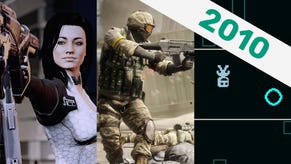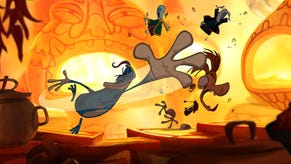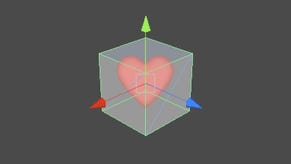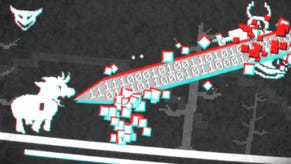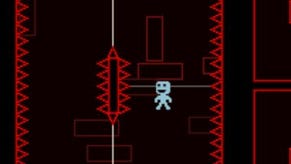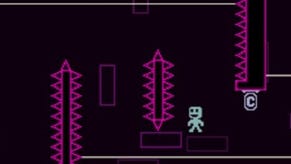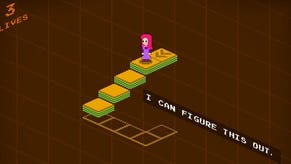VVVVVV for Vendetta: VVVVVV Interview
VVVVVV has been my favourite game of the year so far. Small, perfectly formed and highly punishing, it reminds me of some of my favourite games - and girlfriends, for that matter - of years gone by... without really being like any of them. It's a dream of the past, retro as an idea rather than simple recapitulation. After writing a Wot I Think, I decided it was time to talk to Mr Distractionware - Terry Cavanagh - about all things VVVVVV. Discover below why the Jet Set Willy comparisons aren't quite right, the thinking behind the pricing decision and lots more...
RPS: The basic one - who are you, Terry?
Terry Cavanagh: I'm a game designer.
RPS: Okay - how did you fall in love with games? Are you still in love why games? WHY GAMES?
Terry Cavanagh: I started out programming on the C64 when I was a kid, but at that point it was really more of a technical thing - I enjoyed programming, but I didn't really care about making games, exactly.
The game that really made me want to be a game designer, that made me fall in love with games, was Final Fantasy VII. I think I was maybe 13 or 14 when it came out, and I'd never played anything like it. On a moment to moment basis I just loved everything that game did, everything about how it was constructed. I'm not sure if I'd even played an RPG before that; it was completely alien to me.
Not long after that I started making proper games of my own - I taught myself QBasic, made a load of silly minigames, but mostly worked on one big failed RPG project after another. I've still never made an RPG.
Absolutely, I'm still fascinated with games. I'm not sure if I can even explain why, really - I love making games, I love playing games, I love that games can surprise me and reach me in ways that other mediums don't. Games have been around all my life, and I've seen them grow and change, and I love that there's so much to explore, still. It's a very exciting time to be a game designer!
RPS: Hurrah! Why was now the time to make a commercial Indie game?
Terry Cavanagh: Because I found myself months into a big project and it was the only thing that made sense if I had any hope of continuing to make games into the new year. I've been doing this full time for over two years now, but I ran out of money nearly a year ago. If it wasn't for the Don't Look Back sponsorship money from Kongregate, I would have had to quit way back then.
I try not to think about my debts, mostly - I don't open bank statements or keep track of money going out. I figured I could worry about paying back everything when I got a job, and for the moment I was better off seeing where this game development thing was going to lead me. Otherwise I was probably just going to find myself working to pay off my debts, saving up and eventually going indie again when I'm 30 or something.
I never really thought I was going to be able to do this full time - I just assumed that eventually I'd run out of money and that'd be that.
RPS: Okay, core question - why VVVVVV. What's the inspirations? What were you trying to do?
Terry Cavanagh: VVVVVV is basically an exploration of a single gameplay mechanic. In VVVVVV you can flip gravity, but you can't jump at all. My goal with the game was to explore its level design possibilities as much as I could, without falling back on any elements that I felt would detract from its focus. I wanted to create a game that explored a very simple set of mechanics to its limits.
It's probably just easier to say that I'm influenced by Jet Set Willy, because it's the connection that everybody makes, but I had a C64, not a speccy! It's more accurate to say that I'm influenced by the games that were influenced by Jet Set Willy, like Monty on the Run and Jack the Nipper 2 and Mystery of the Nile and all the weird budget games I had when I was a kid. Dizzy was a really big influence too - the facial expressions and individually named rooms and single colour sprites in VVVVVV all come right out of that.
RPS: Your last two free indie games - Don't Look Back and Judith - have leaned towards the art game side of things, full of negatively charged emotions. VVVVVV's character leans emotionally joyous and towards pure ludic craft. Could you talk about your thinking here?
Terry Cavanagh: Pretty much all my games are concept driven; I'm inspired by some core idea, so I start working on it and see how it develops. Judith, for example, just started from me and Stephen wanting to mess around with some fucked up raycasting renderings. And Don't Look Back was initially just an exercise in a minimalist graphical style before I ended up fusing it with a lot of other loose ideas.
The point is I don't necessarily know how a game is going to develop right away, so it's not like VVVVVV was an intentional break from the kind of games I was making earlier last year - I was inspired to explore this particular gameplay mechanic in more detail, and it just ended up having a different mood to some of my other games. I guess it might have been possible to take VVVVVV in a, I dunno, let's say darker direction - but it was pretty clear from quite early in development that VVVVVV was going to be something more upbeat.
RPS: You clearly like a retro-seeming aesthetic... or do you actually grate at that? I saw some fascinating complaints about VVVVVV because it wasn't "real" pixel art. It seems to me that you were more interested in creating the impression of an artifact from a past age rather than the actuality. What are you trying to do with the graphics?
Terry Cavanagh: I've probably got funny ideas about what I think looks good - I'm no artist, but what I am basically trying to do with my graphics is make my games look distinctive and different. I like experimenting with strange looking and interesting graphical styles, and I think it's easier to do this at low resolutions. These days I almost never do anything above a resolution of 320x240. I don't really have any interest in sticking rigidly to the limitations of any specific machine, but I do like working within graphical constraints.
RPS: In passing, while the game screams fun, I found myself Awwwing at the romance between two of the Vs. The emotional response to these really simple characters is cartoony, but strong, if you see what I mean - certainly more than many cut-scene heavy games. It's an interesting counter-point to the whole Molyneux idea that you need to see the eyes dilate to really relate with something. What do you think about that?
Terry Cavanagh: My approach to VVVVVV's story isn't that far off my approach to its graphics - I think its one dimensional characters sorta work for the same reason that low resolutions graphics do - if all the details aren't there, you fill in the gaps yourself.
Generally, I think there's a lot to be said for threading lightly with videogame storytelling, and not forcing the player to engage with the story any more than they want to - personally, I just find that sorta thing far more immersive than drawn out cutscenes and epic backstories and whatnot.
It might surprise some people how much dialogue there actually is in VVVVVV, by the way - you can talk to the crewmates back on the ship over and over again, and they have different things to say depending on when you talk to them and who you've rescued.
Exploring how you can use games to tell stories in interesting ways is something I care a lot about, and something I want to do a lot more of this year.
RPS: The price has proved contentious. Could you explain your thinking behind the fifteen dollars? Any thoughts on Indie pricing generally?
Terry Cavanagh: Well, the bottom line for me is that I want to be able to afford to keep making games, and almost everything I read and everyone I talked to before the launch said that I'd have a much better chance at that if I charged $19.99. But that felt a bit expensive to me - I went with $15 dollars because that's about 10 euros, and that seemed like a nice round, fair price.
What eventually made my mind up was reading Jeff Vogel's series of articles about indie game pricing, "Why Indie Games Should Cost More" (Part 1, Part 2).
RPS: And - hating to be obvious - what next?
Terry Cavanagh: I wanna go back to making smaller games for a while! My big plan for this year is to try and make a game a month - though I haven't had a whole lot of time to work on my January game yet. I've got a lot of unfinished prototypes from last year that I finally want to finish, and lots of ideas for new stuff too.
RPS: Thanks for your time.
VVVVVV is available to purchase for 15$. You can download a demo version from here.





